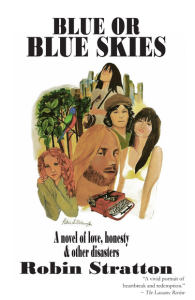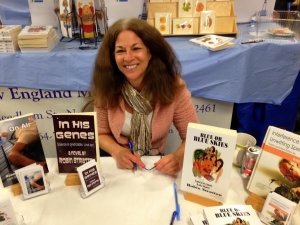 her many contributions, hails from Boston, MA. Her work shines in everything she writes: flash, dribbles, poetry, haiku, novels, chapbooks, nonfiction, and seemingly every genre you can think of. Aside from being a four-time Pushcart Prize nominee, she’s been a writing coach for almost 25 years, teaches writing workshops, founded Big Table Publishing Company, and is the editor of the prominent Boston Literary Magazine.
her many contributions, hails from Boston, MA. Her work shines in everything she writes: flash, dribbles, poetry, haiku, novels, chapbooks, nonfiction, and seemingly every genre you can think of. Aside from being a four-time Pushcart Prize nominee, she’s been a writing coach for almost 25 years, teaches writing workshops, founded Big Table Publishing Company, and is the editor of the prominent Boston Literary Magazine.
Aside from publishing in Word Riot, 63 Channels, Antithesis Common, Poor Richard’s Almanac(k), Blink-Ink, Pig in a Poke, Chick Flicks, Up the Staircase, Shoots and vines, and many others, her own novels, story and poetry collections, and a writing guide include On Air (which was a National Indie Excellence Book Award finalist), Of Zen and Men, In His Genes, Blue or Blue Skies, Dealing with Men, and Interference from an Unwitting Species.
Since I recently had the pleasure of reading Blue and Blue Skies: A novel of love, honesty, & other disasters, I’ll be focusing the interview on this book, a fascinating tale of five friends, all pursuing serious goals and dreams, many of them artistic, and what happens when the dreams, the friendships, and the love conflicts. Don’t miss Robin’s book trailer of this novel below.
 Bonnie ZoBell: Welcome, Robin! I love the first line of Blue or Blue Skies: “Before our group formed, before we fell in love with the wrong people, and before success ruined everything, it was just me admiring this painting of a sand castle slowly being consumed by the tide.” It’s definitely a successful first line because it immediately makes me want to know about the group, the wrong people that are fallen in love with, and what kind of success you mean. Did you always have your first line, or (like me) did you go through a thousand others first?
Bonnie ZoBell: Welcome, Robin! I love the first line of Blue or Blue Skies: “Before our group formed, before we fell in love with the wrong people, and before success ruined everything, it was just me admiring this painting of a sand castle slowly being consumed by the tide.” It’s definitely a successful first line because it immediately makes me want to know about the group, the wrong people that are fallen in love with, and what kind of success you mean. Did you always have your first line, or (like me) did you go through a thousand others first?
Robin Stratton: I love so much that you asked this question! Originally the first line was “What caught my eye was this painting of a sand castle slowly being consumed by the tide…” It was the very first line I wrote, and it was just about the only line that didn’t change, despite all the massive rewrites for the next 18 years. Then, when I thought the book was done, I sent it to a professional editor who said she loved the intro scene, but that the first line was wrong because there needed to be a hint that this story was going to be about a group of friends. Changing that line was hard because like I say it had always been that line… I might go so far as to say it was my favorite line in the whole book! So my knee-jerk reaction was to not do what she suggested. However, she’s a NY Times best-selling author whose latest novel had just been voted one of People Magazine’s Top 25 books for the year, so who was I to disagree? I fiddled around with that first line for about two months, trying out so many different approaches, but maintaining the imagery of the sand castle, which of course foreshadows the fate of one of the characters. Finally one day the part about falling in love with the wrong people just popped into my head, and I knew that was IT.
BZ: You do a wonderful job with these five main characters. Even though we hear the story mostly through the narrator, we also get a strong sense of Daryl, Terry, Meredith, and Jeff. Where do these and others of your characters come from? Did you have them all figured out ahead of time, or did they come to you as you’re writing?
RS: As a dirt poor writer, I wanted to feature the classic struggling artist who was willing to do whatever it took to make his dream come true. So Daryl was sort of like me – he sacrificed heat and food and a nice apartment because he refused to get a “real” job the way all his friends did. Like him, I was poor – lived with my parents, drove my grandmother’s 1971 Pontiac, and watched all my friends grow up, marry nice men, move into lovely homes and have kids– so I based him on me. Terry is the Man Who Has It All—he’s a famous rock star—to provide contrast and show that at the end of the day, happiness doesn’t depend on riches or fame, it has to be a choice, it has to come from within. The other characters emerged as the book was being written, and I came up with the idea of having character dreams collide – in other words, if one character got their dream, the other character wouldn’t.
BZ: While I feel very at home in the narrator’s voice and liked seeing the world through her eyes, Daryl is definitely a favorite character, too. He’s so complicated and perverse as to seem extremely real. Do you think people who are great artists are always a bit off in order to be able to see the world better and make their art? Do you think you’re a little off, Robin?
RS: I wanted to show how an artist can have a dream that takes over his life, and how that impacts the lives of those who love him. You have to admire his dedication, but yeah, you find yourself thinking he’s a bit of a social misfit. When I was still living at home and not doing anything but writing, yes, I thought I was a little “off.” Like I say, all my friends had gone the traditional route: job, husband, house, children. I used to wonder why I didn’t envy them because I was so lonely and so isolated – but I knew I was being true to my passion, and for several years, really, that’s all I had to make myself feel “okay” about my decision to be a writer, no matter what.
BZ: One of the strengths of your book is how in depth you go with each character. Some of them do fall in love with the wrong people, just like we do, and they face complexities within themselves that aren’t always easy to write about but that you handle with aplomb. Could you talk about one or two of these characters that were either a challenge or that you particularly related to?
RS: I had fun crafting the narrator because she was so different from me. She was everything I wanted to be – she’d fallen into fame, had a gorgeous home, was recognized when she went out, and her publishing company sent her on cross-country tours. To me, that was the dream. But as the story progressed, a sadness in her emerged, and I hadn’t anticipated that. It took years for her to fully develop. Her character changed the most over the 20-year period it took for me to write the book – her role originally was to be this unremarkable character reporting on the achievements of the remarkable people who surrounded her.
BZ: The plot here in Blue Skies is pretty intricate. I’m always curious in other writers, whether they have it all outlined ahead of time or figure out the plot as they go.
RS: I had a good idea of how this would end, but how to get to that point, you know? That’s always the question. Lots of the story lines fell in to place; some moments of conflict came as suggestions from my writing partners. The logistics of the ending came to me after I watched a documentary about the McCarthy Hearings and how divulging certain information could have disastrous consequences.
BZ: You’re also very good at tension. I could hardly put this book down, and I’ve read the same thing in other interviews about and reviews of Blue and Blue Skies as well. What is your secret?
RS: Oh thank you!! Yes, that’s what people say, and it’s my favorite comment from any reader. I love when they email to say they’re furious because they were up all night reading and now they’re at work and they can’t keep their eyes open. 🙂 Suspense is so important to me – the ability to keep readers turning pages – that is the ultimate accomplishment. With that in mind, I studied how other writers accomplished it. One of my mentors, believe it or not, was Sidney Sheldon. He had so many things going on, he kept hitting the characters with one thing after another, so that I’d lie in bed thinking, Okay, I am going to read just one more chapter and then I am definitely going to bed – and the next thing I’d know, the sun would be coming up. I always make sure to end my chapters on what I call a “whoa! note.”
BZ: What are you working on now? Don’t you have another book coming out soon? Could you tell us a little about that?
RS: No novels, but with the help of my poetry group, I am compiling enough poems and short stories to make a third collection, and I’m really excited about that. I just started a short story last night that I hope to enter into a contest on NPR.
BZ: I appreciate your coming by, Robin! So interesting to hear what other writers are up to.

I enjoyed this interview and look forward to reading the book!
Thanks, Jeannie! Hope you enjoy. I’m sure you will! b
As a Terry Kath fan, his picture on the cover intrigued me. Then to find a character with a very similar name in the book, with similar traits…. one has to believe the Terry Castle character was based on him. Especially with the dedication to “The real T.K.”.